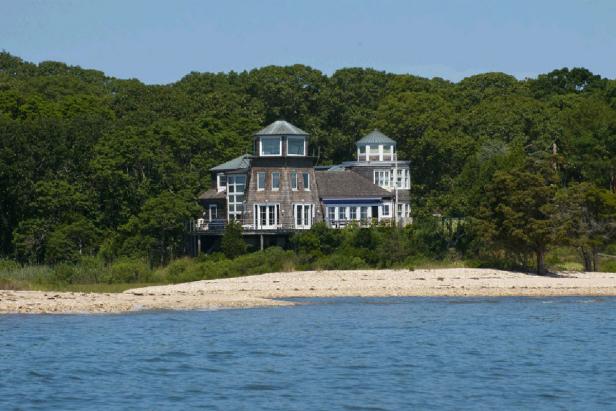Guide to Buying a Second Home or Vacation Home

Brown Harris Stevens
One out of three homes sold in 2007 was a vacation home or investment property, showing that demand for second homes remains healthy despite a slow housing market. Reasons for buying a second home vary, from recreation and vacation enjoyment to investment and development to retirement planning.
With homebuyers enjoying an advantage in many markets, now may be the time to buy that second home. Whether you're dreaming of paradise or profit, follow these five steps for a smart investment:
- Step 1: Decide if it’s the right time to buy
- Step 2: Know what to look for in a second home
- Step 3: Explore financing options and negotiate with the seller
- Step 4: Learn the tax ins and outs
- Step 5: Research alternative ownership options
Second Home Factoids:
Median age of buyer: 46 (baby boomers own 57 percent of all second homes)
Median household income: $99,100
Median price of second home/nonprimary residence: $211,000
No. 1 reason for buying: Family retreat
No. 2 reason: Future primary residence
No. 1 location to buy: The South
No. 2 location: The West
Most popular type: detached single-family homes, followed by townhomes and condominiums
Most popular area: suburbs, followed by small towns, urban areas, resort and vacation areas
Source: National Association of Realtors
Step 1: Decide if it’s the right time to buy.
Think through your plans for a second property before you leap, advise experts.
- Assess your goals. It may come down to investment reasons, vacation enjoyment or a combination of both. Want a place within driving distance for a retreat? Looking for a family vacation spot? A jump on a retirement home?
- Consider the market conditions, your personal finances and the affordability of the property. Given the downturn in housing prices with many U.S. regions taking hits, there are deals to be had, says Melanie Greenstein, principal of Rise Network in Minneapolis, a real estate brokerage specializing in second homes. “Use the right agent in the right city and if you do your homework, you can find some phenomenal buys. Don’t plan to flip or sell the property within the next 12 to 24 months.”
- Focus on areas with steady appreciation rates. Don’t bank on renting out the home or having all your expenses covered, advises Lynda Traverso, GRI, Realtor with VIP Realty Group in Sanibel Island, Fla. “Do look at a second home as an investment and consider areas where homes are going to appreciate.”
Step 2: Know what to look for in a second home.
Once you have a good idea of your goals around a second home, it comes down to homework and scouting for the right property in the right location.
- Try it out first.
When assessing location, particularly for a vacation home in an area you’re not familiar with, renting for at least one stay is always a good first step. Carefully consider travel time and expenses against how often you plan to use the home, real estate broker Ruth Krinke says. “How accessible is the property? With the price of gas today and rising airfares, this is a big issue.”
- Talk to the locals.
Even if you’ve been vacationing in the same area for years, getting to know the place from a local perspective is important before buying a home there. Talk to residents and ask them what they like about the area, how it’s changing, what types of people are moving there and what it’s like off-season.
- Act like a local.
You should also visit the area yourself during each season to get a feel for what it’s like year round. While you’re there, scope out restaurants, grocery stores and entertainment. Does the area have enough of the things you like to keep you interested? Also check out the public school system; even if you never plan on your kids attending there, homes near great schools have more value.
- Look at the comps.
To help gauge whether the property is a good investment, review other home sales in the community to examine what the track record is on resale values of similar properties, Traverso says.
- Know the rules of renting.
If you plan to rent the property, expect to do additional research. For example, some communities ban weekly vacation rentals, allowing only for monthly rentals. “It depends on the homeowners association and the city law,” Traverso says. On the flip side, if you’re craving a quiet retreat, you may not want to vacation in a community with a lot of rental turnover.
- Work with an experienced agent.
A seasoned real estate agent can help you weigh your criteria and make all the difference in a second home purchase. Try these tips for finding an agent or broker:- Scout local listings, including free sales publications that list the type of property you want to buy.
- Find an agent that knows the area and property values. “Select one with at least five years minimum experience in that marketplace, preferably more,” Greenstein says.
- For extensive searches, scouting in resort communities or exploring alternatives like fractional ownership, consider an agent with the Resort & Second Home Property Specialist (RSPS) Certification by the National Association of Realtors.
- Beyond the sale, a good agent will stay in contact and help you. This is particularly important for homeowners who may not live near the property.
Step 3: Explore financing options and negotiate with the seller.
In many ways, second home purchases are similar to the primary home purchase. Realtors say putting 20 percent down or more is common for second homes to avoid the expense of mortgage insurance and given today’s tightened lending practices. “It’s possible to buy a true second home with 5 or 10 percent down, but it’s tricky,” says Ruth Krinke, RSPS (Resort & Second Home Property Specialist), associate broker with Steamboat Real Estate in Steamboat Springs, Colo.
When it comes to negotiating, second home sellers may be more flexible than their primary-home counterparts. “Second home sellers are often more flexible in price and terms of sale. They may want out because they are overextended or their lifestyle has changed,” Greenstein says.
To move the sale along, buyers can request special terms of the seller. For example, as an incentive, sellers might be willing to carry a second mortgage for three to five years, Traverso says. “Sometimes banks will accept 10 percent from the seller when the buyer puts down 10 percent. The seller may take on a burden to get the deal done when banks will only loan 80 percent of the value of the home.”
Consider these tips when investigating your financing options:
- For mortgage financing, use a local lender in the area you are buying, Traverso says, because its expertise and knowledge of the market can avoid problems later;
- Stricter guidelines are involved in qualifying for a mortgage for an investment property. Typically, borrowers pay a higher interest rate;
- If you do need the rental income to qualify for the loan, you may need a minimum of 25 percent down, Krinke says. Lenders tend to give credit for up to a 75 percent occupied rate;
- Other forms of financing include tapping into your primary home’s equity line of credit, known as HELOCs.
Step 4: Learn the tax ins and outs.
Savvy tax planning can make a difference in your return on the property. Tax implications for second homes can vary significantly based on your financial situation and whether or not you plan to rent out the property. Keep these in mind when figuring the impact on your taxes:
- Consider property taxes, utilities, homeowners association fees and other applicable expenses.
- Generally, the interest on the mortgage of your second home is tax deductible, and rental properties are subject to additional tax breaks. “If it’s an investment property, then the deductions come in an array of possibilities, including depreciation of the real estate itself and a separate, accelerated depreciation of personal property such as furnishings,” Krinke says. “Owners can use the property only for two weeks a year to get certain tax benefits on rentals,” Greenstein cautions.
- If you rent out the home for 15 days or more during the year, you have to report all rental receipts to the IRS as income, but you can also deduct operating expenses such as utilities, repairs, insurance and management fees against that income.
- Consider strategies for reducing or deferring capital gains upon the sale of the home. For example, the Internal Revenue Code Section 1031 tax-deferred exchange allows for the deferral of capital-gains tax by exchanging for “like kind” property allowing for taxes to be paid when a sale of a second or third property is ultimately realized. As a general rule, 1031s are used when you sell real estate held for investment purposes and not for the sale of your personal residence.
- Always consult with a tax professional or a specialist such as a national qualified intermediary for tax-deferred exchanges before getting too far into the second-home buying process.
Step 5: Research alternative ownership options.
In addition to single-family homes, townhomes and traditional condominiums, experts say to tread cautiously with alternative ownership forms of vacation homes such as fractional ownership, vacation clubs, time shares and condo hotels.
Resale values on certain types of cooperative-ownership properties may not hold up over time and selling these properties can be a burden. “Resale values on fractional ownership properties are usually higher than time shares because very few timeshares are actually deeded ownership,” Krinke says.
Financing is easiest around single-family homes, Krinke says. “Multifamily dwellings, townhomes and particularly condos, can be difficult to arrange financing for.”
Whether you're looking for a home to spend your retirement days or an investment property to diversify your portfolio, make sure you do your homework and work with the right experts.














































